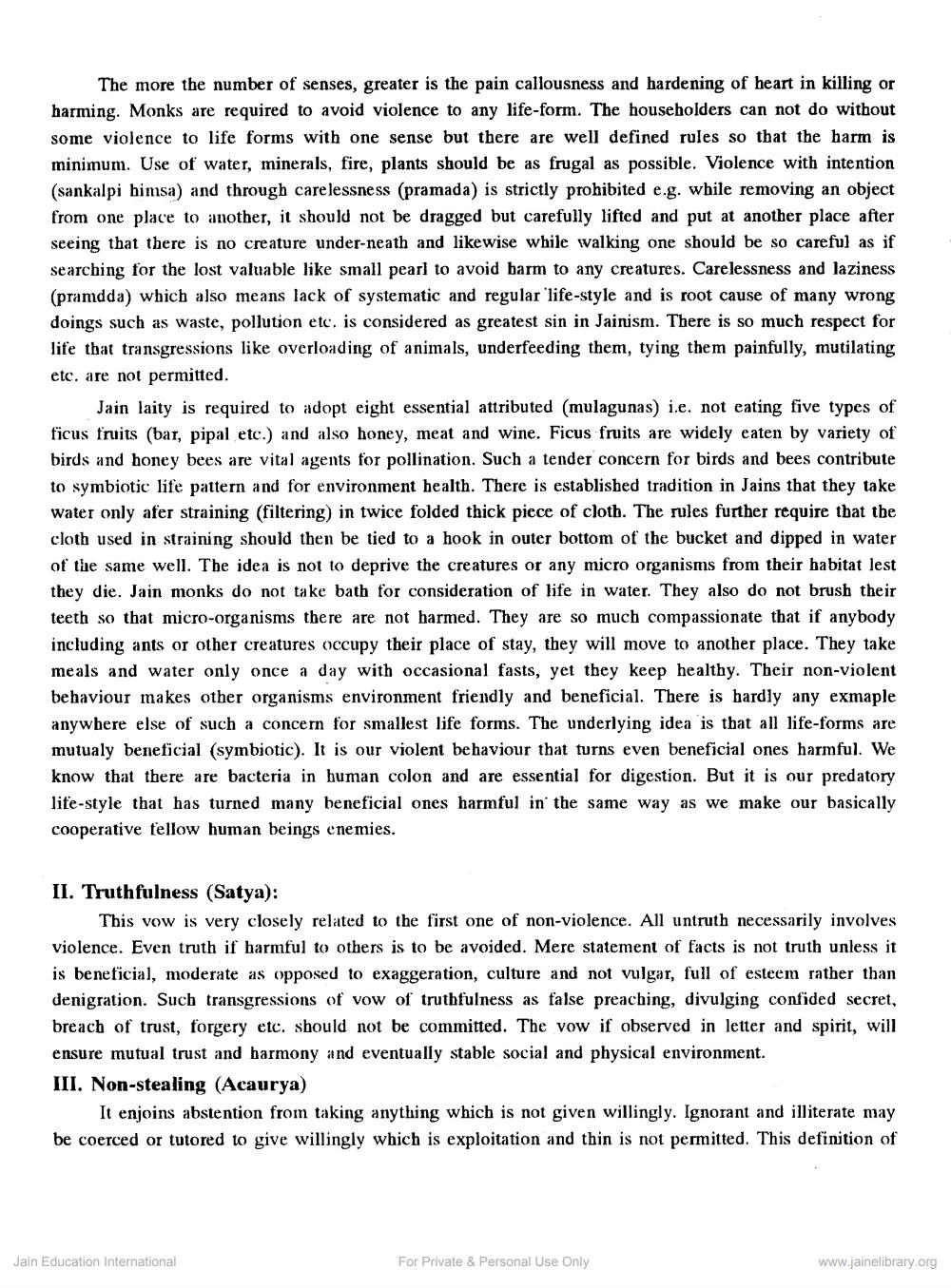________________
The more the number of senses, greater is the pain callousness and hardening of heart in killing or harming. Monks are required to avoid violence to any life-form. The householders can not do without some violence to life forms with one sense but there are well defined rules so that the harm is minimum. Use of water, minerals, fire, plants should be as frugal as possible. Violence with intention (sankalpi himsa) and through carelessness (pramada) is strictly prohibited e.g. while removing an object from one place to another, it should not be dragged but carefully lifted and put at another place after seeing that there is no creature under-neath and likewise while walking one should be so careful as if searching for the lost valuable like small pearl to avoid harm to any creatures. Carelessness and laziness (pramdda) which also means lack of systematic and regular 'life-style and is root cause of many wrong doings such as waste, pollution etc. is considered as greatest sin in Jainism. There is so much respect for life that transgressions like overloading of animals, underfeeding them, tying them painfully, mutilating etc. are not permitted.
Jain laity is required to adopt eight essential attributed (mulagunas) i.e. not eating five types of ficus fruits (bar, pipal etc.) and also honey, meat and wine. Ficus fruits are widely eaten by variety of birds and honey bees are vital agents for pollination. Such a tender concern for birds and bees contribute to symbiotic life pattern and for environment health. There is established tradition in Jains that they take water only afer straining (filtering) in twice folded thick piece of cloth. The rules further require that the cloth used in straining should then be tied to a hook in outer bottom of the bucket and dipped in water of the same well. The idea is not to deprive the creatures or any micro organisms from their habitat lest they die. Jain monks do not take bath for consideration of life in water. They also do not brush their teeth so that micro-organisms there are not harmed. They are so much compassionate that if anybody including ants or other creatures occupy their place of stay, they will move to another place. They take meals and water only once a day with occasional fasts, yet they keep healthy. Their non-violent behaviour makes other organisms environment friendly and beneficial. There is hardly any exmaple anywhere else of such a concern for smallest life forms. The underlying idea is that all life-forms are mutualy beneficial (symbiotic). It is our violent behaviour that turns even beneficial ones harmful. We know that there are bacteria in human colon and are essential for digestion. But it is our predatory life-style that has turned many beneficial ones harmful in the same way as we make our basically cooperative fellow human beings enemies.
II. Truthfulness (Satya):
This vow is very closely related to the first one of non-violence. All untruth necessarily involves violence. Even truth if harmful to others is to be avoided. Mere statement of facts is not truth unless it is beneficial, moderate as opposed to exaggeration, culture and not vulgar, full of esteem rather than denigration. Such transgressions of vow of truthfulness as false preaching, divulging confided secret, breach of trust, forgery etc. should not be committed. The vow if observed in letter and spirit, will ensure mutual trust and harmony and eventually stable social and physical environment. III. Non-stealing (Acaurya)
It enjoins abstention from taking anything which is not given willingly. Ignorant and illiterate may be coerced or tutored to give willingly which is exploitation and thin is not permitted. This definition of
Jain Education International
For Private & Personal Use Only
www.jainelibrary.org




